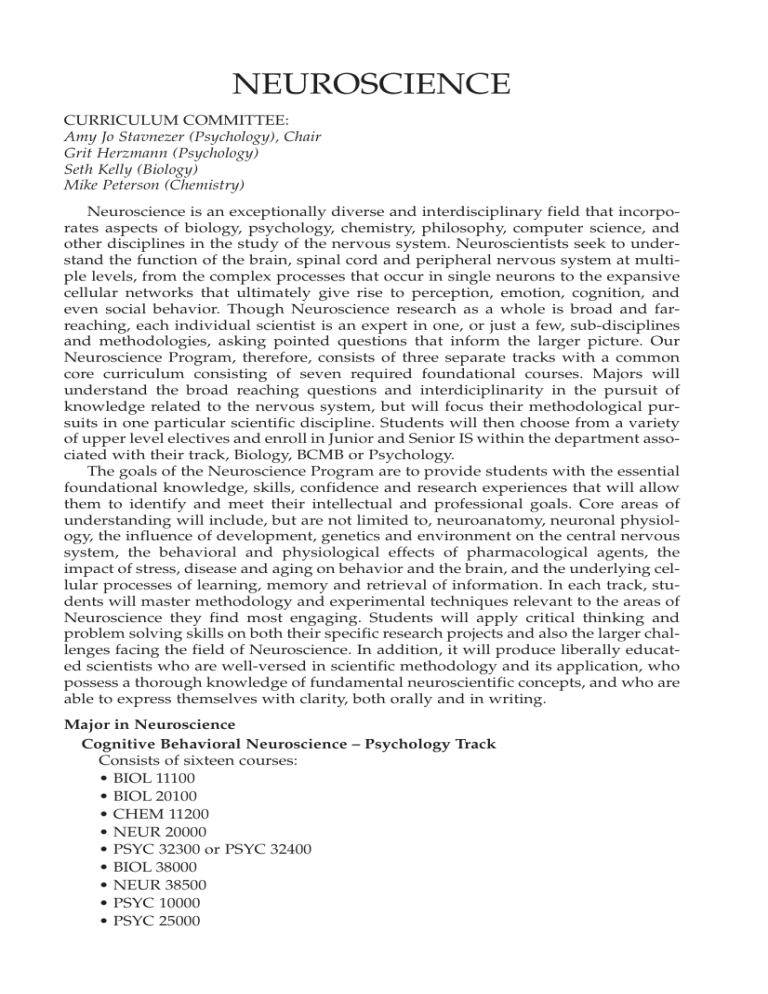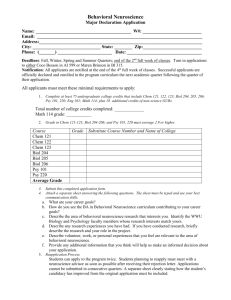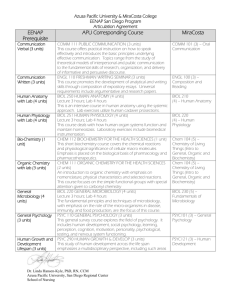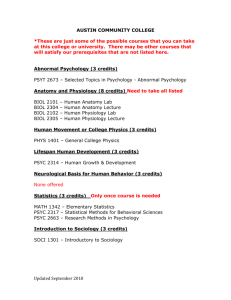neuroscience - The College of Wooster

NEUROSCIENCE
CURRICULUM COMMITTEE:
Amy Jo Stavnezer (Psychology), Chair
Grit Herzmann (Psychology)
Seth Kelly (Biology)
Mike Peterson (Chemistry)
Neuroscience is an exceptionally diverse and interdisciplinary field that incorporates aspects of biology, psychology, chemistry, philosophy, computer science, and other disciplines in the study of the nervous system. Neuroscientists seek to understand the function of the brain, spinal cord and peripheral nervous system at multiple levels, from the complex processes that occur in single neurons to the expansive cellular networks that ultimately give rise to perception, emotion, cognition, and even social behavior. Though Neuroscience research as a whole is broad and farreaching, each individual scientist is an expert in one, or just a few, sub-disciplines and methodologies, asking pointed questions that inform the larger picture. Our
Neuroscience Program, therefore, consists of three separate tracks with a common core curriculum consisting of seven required foundational courses. Majors will understand the broad reaching questions and interdiciplinarity in the pursuit of knowledge related to the nervous system, but will focus their methodological pursuits in one particular scientific discipline. Students will then choose from a variety of upper level electives and enroll in Junior and Senior IS within the department associated with their track, Biology, BCMB or Psychology.
The goals of the Neuroscience Program are to provide students with the essential foundational knowledge, skills, confidence and research experiences that will allow them to identify and meet their intellectual and professional goals. Core areas of understanding will include, but are not limited to, neuroanatomy, neuronal physiology, the influence of development, genetics and environment on the central nervous system, the behavioral and physiological effects of pharmacological agents, the impact of stress, disease and aging on behavior and the brain, and the underlying cellular processes of learning, memory and retrieval of information. In each track, students will master methodology and experimental techniques relevant to the areas of
Neuroscience they find most engaging. Students will apply critical thinking and problem solving skills on both their specific research projects and also the larger challenges facing the field of Neuroscience. In addition, it will produce liberally educated scientists who are well-versed in scientific methodology and its application, who possess a thorough knowledge of fundamental neuroscientific concepts, and who are able to express themselves with clarity, both orally and in writing.
Major in Neuroscience
Cognitive Behavioral Neuroscience – Psychology Track
Consists of sixteen courses:
• BIOL 11100
• BIOL 20100
• CHEM 11200
• NEUR 20000
• PSYC 32300 or PSYC 32400
• BIOL 38000
• NEUR 38500
• PSYC 10000
• PSYC 25000
• PSYC 23000
• Four of the following courses: PHIL 21500, PHIL 22000, PSYC 23500, PSYC
31500, PSYC 31800, PSYC 32100, PSYC 32200, PSYC 33500, BIOL 35200,
BIOL 37700
• Junior Independent Study: see Special Notes below
• Senior Independent Study: PSYC 45100
• Senior Independent Study: PSYC 45200
Neurobiology – Biology Track
Consists of sixteen courses:
• BIOL 11100
• BIOL 20100
• CHEM 11200
• NEUR 20000
• PSYC 32300 or PSYC 32400
• BIOL 38000
• NEUR 38500
• BIOL 20200
• BIOL 20300
• CHEM 21100
• Three of the following courses: BIOL 30400, BIOL 30500, BIOL 30600, BIOL
30700, BIOL 34400, BIOL 35200, BIOL 37700
• Junior Independent Study: BIOL 40100
• Senior Independent Study: BIOL 45100
• Senior Independent Study: BIOL 45200
Cellular Neurophysiology – BCMB Track
Consists of sixteen courses:
• BIOL 11100
• BIOL 20100
• CHEM 11200
• NEUR 20000
• PSYC 32300 or PSYC 32400
• BIOL 38000
• NEUR 38500
• BCMB 30300
• BIOL 30500
• CHEM 21100
• CHEM 21200
• Two of the following courses: BIOL 30400, BIOL 30600, BIOL 30700,
BCMB 33100
• Junior Independent Study: BCMB 40100
• Senior Independent Study: BCMB 45100
• Senior Independent Study: BCMB 45200
Special Notes
• Junior Independent Study (Cognitive Behavioral Neuroscience): The College requirement of a unit of Independent Study in the junior year is satisfied by
PSYC 32100, 32200, 32300, 32400 or 33500 (in addition to the core requirement of
32300 or 32400) prior to Senior Independent Study.
• See Chemistry Department information on placement exams for CHEM
11100/11200.
• First year students are advised to complete all 100-level courses and at least one
200-level course by the end of the first year.
• The Core courses (not including NEUR 38500) and at least one elective specific to your track must be completed by the end of the Junior year.
• For those in the Cognitive Neuroscience track, BIOL 35200, and 37700 require
BIOL 20200 as a prerequisite.
• The laboratory and classroom components are closely integrated in the upperlevel Biology and Psychology courses and must therefore be taken concurrently.
The course and laboratory grades will be identical and are based on performance in both components; the relative weights of the two components are stated in each course syllabus.
• Students, depending upon their track, are also encouraged to take the following courses, which are requirements for many graduate, medical and other pre-professional programs: CHEM 21100 and 21200 (Organic Chemistry sequence),
CHEM 33100 and 33200 (Biochemistry sequence), PHYS 20300, and MATH
11100 (OR both MATH 10700 and 10800).
• Cognitive Behavioral track majors may not double major with Psychology or
Biology; Neurobiology and Cellular Neurophysiology track majors may not double major with Biology, BCMB or Chemistry.
• Cognitive Behavioral track majors may not minor in Psychology; Neurobiology and Cellular Neurophysiology track majors may not minor in Biology or
Chemistry. Any minor must consist of six courses that do not double-count with the Neuroscience major.
• No minor in Neuroscience is offered.
• Only grades of C- or better are accepted for the major, with the exception of
PSYC 25000 that requires a C or better.
NEUROSCIENCE COURSES AND CROSS-LISTED COURSES
ACCEPTED FOR NEUROSCIENCE CREDIT
BIOCHEMISTRY & MOLECULAR BIOLOGY
BCMB 30300. TECHNIQUES IN BIOCHEMISTRY AND MOLECULAR BIOLOGY
BCMB 33100. PRINCIPLES OF BIOCHEMISTRY
BIOLOGY
BIOL 11100. FOUNDATIONS OF BIOLOGY [MNS]
BIOL 20100. GATEWAY TO MOLECULAR AND CELLULAR BIOLOGY [Q, MNS]
BIOL 20200. GATEWAY TO ECOLOGY AND EVOLUTIONARY BIOLOGY [W, Q, MNS]
BIOL 20300. RESEARCH SKILLS FOR LIFE SCIENCES
BIOL 30400. HUMAN PHYSIOLOGY
BIOL 30500. CELL PHYSIOLOGY [W†]
BIOL 30600. GENES AND GENOMES
BIOL 30700. DEVELOPMENT
BIOL 34400. COMPARATIVE ANIMAL PHYSIOLOGY
BIOL 35200. ANIMAL BEHAVIOR
BIOL 37700. BEHAVIORAL ENDOCRINOLOGY
BIOL 38000. CELLULAR NEUROSCIENCE
CHEMISTRY
CHEM 11200. PRINCIPLES OF CHEMISTRY [Q, MNS]
CHEM 21100. ORGANIC CHEMISTRY I [MNS]
CHEM 21100. ORGANIC CHEMISTRY I [MNS]
CHEM 21200 ORGANIC CHEMISTRY II [W, MNS]
PHILOSOPHY
PHIL 21500. BIOMEDICAL ETHICS [AH]
PHIL 22200. SCIENTIFIC REVOLUTIONS AND METHODOLOGY [AH]
PSYCHOLOGY
PSYC 10000. INTRODUCTION TO PSYCHOLOGY [HSS]
PSYC 23000. HUMAN NEUROPSYCHOLOGY [HSS]
PSYC 23500. EVOLUTIONARY PSYCHOLOGY [HSS]
PSYC 25000. INTRODUCTION TO STATISTICS AND EXPERIMENTAL DESIGN [Q]
PSYC 31500. MUSIC AND SPEECH PERCEPTION
PSYC 31800. HEMISPHERIC SPECIALIZATION
PSYC 32100. LEARNING AND BEHAVIOR [W]
PSYC 32200. MEMORY AND COGNITION [W]
PSYC 32300. BEHAVIORAL NEUROSCIENCE [HSS, W]
PSYC 32400. COGNITIVE NEUROSCIENCE [HSS, W]
PSYC 33500. PERCEPTION AND ACTION [W]
NEUR 20000. INTRODUCTION TO NEUROSCIENCE
This course focuses on basic neuroanatomy, fundamental neuronal physiology and basic research methodology to provide foundational content knowledge related to neuroscience. Recommended prerequisites: PSYC 10000 or BIOL 11100 before registration.
NEUR 38500. INTEGRATIVE NEUROSCIENCE SEMINAR
This course is intended for senior Neurosience majors who have completed all core Neuroscience requirements associated with their track and Junior IS. This course will provide a common experience for all neuroscience majors that will encourage you to integrate coursework across the neuroscience curriculum and approach problems in neuroscience from multiple levels of analysis. We will read, discuss, and critically evaluate primary literature in the field of neuroscience on just one or two focused areas. Spring.
NEUR 40100. INTRODUCTION TO INDEPENDENT STUDY
Students will attend weekly classroom meetings which focus on science writing, accessing and evaluating primary literature, and experimental design. The major paper will include a literature review and a detailed research proposal related to their I.S. thesis research. Students will also participate in the peer review process as well as present an oral research proposal presentation at the end of the semester. Annually. Spring.
NEUR 45100. SENIOR INDEPENDENT STUDY – SEMESTER ONE
The first semester of the Senior Independent Study project, in which each student engages in creative and independent research guided by a faculty mentor and which culminates in a thesis and an oral examination in the second semester. Prerequisite: NEUR 40100.
NEUR 45200. SENIOR INDEPENDENT STUDY – SEMESTER TWO
The second semester of the Senior Independent Study project, which culminates in the thesis and an oral examination. Prerequisite: NEUR 45100.






